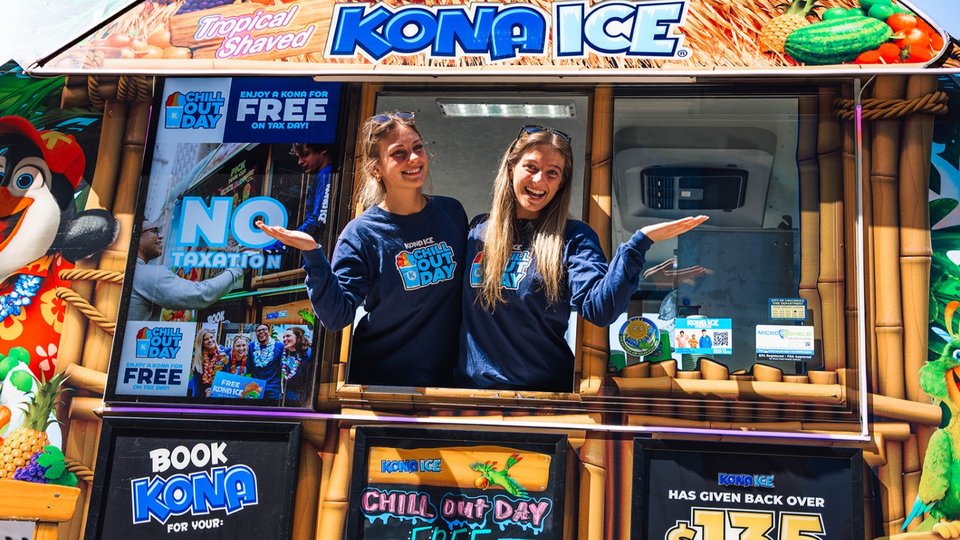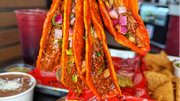Food & Beverage
Kona Ice CEO says food truck industry must come together
Kona Ice CEO Tony Lamb said that the food truck industry has the potential to make big inroads with regulations and issues, if they are willing to come together.

October 13, 2025 by Bradley Cooper — Editor, ATM Marketplace & Food Truck Operator
The food truck industry is huge and keeps growing. It is currently valued at $2.8 billion according to data from IBISWorld. This includes more than 92,200 food truck businesses, which have grown at a compound annual growth rate of 23.8% since 2020. IBISWorld also notes that the industry has a low barrier to entry, which makes it easy for newcomers to get involved at any point.
Despite this growth, the industry still has many challenges, chief among them are the myriad of regulations, licenses and protocols operators have to follow. In many cases, simply driving a few minutes down the road means paying new fees, performing another inspection and other issues. That's to say nothing on how different localities have different rules of where and when food trucks can park.
In order to tackle this issue, Tony Lamb, founder and CEO of Kona Ice said in a phone interview with Food Truck Operator that the industry needs to come together.
Kona Ice's success
Unlike most food trucks, Kona Ice is a massive franchise, with 2,200 franchised truck "on the road in 49 states," Lamb said, along with 1,000 ancillaries, which include kiosks, trailers or a mini truck for events.
Lamb said he came up with the idea for Kona Ice when his children had a bad experience getting ice cream from an ice cream truck in the neighborhood. He described this idea as "bottled lightning" that hit at just the right moment.
In addition to Kona Ice, Lamb is also working on other food trucks such as Travelin' Tom's, a coffee truck concept with 310 trucks and Beverly Ann's, which began last year providing baked cookies from a commissary.
Despite this huge success, Lamb said he has no plans to move towards brick and mortar.
"Brick and mortar is ridiculous," he said, pointing to the huge success in the mobile world.
Left out?
However, Lamb argues that many in the food truck industry are not willing to engage with each other, and others are left out entirely.
As an example, he said that many operators don't have insurance for trucks, which means they can't attend events or industry associations.
In Lamb's case, he said he has been forced out of many food truck industry gatherings because he runs a franchise.
"I'm not trying to lead, I just want a voice," he said.
A voice for the industry
He said despite being left out of industry events, he is advocating for the food truck industry through groups like NSF International and by lobbying for standardized regulation.
"The NSF is running a task force right now to write standardized regulations for mobile food units. We are on that task force," Lamb said.
On the lobbying side, he said Kona Ice has been working with several states to pass standardized regulations. One of their biggest success stories is in in Texas, which recently passed House Bill 2844, the Food Truck Freedom Bill.
With this bill, there is a single mobile food vendor license for the entire state, so vendors don't have to get individual permits from counties and cities. The Texas Department of State Health Services will manage the entire operation, according to a report by KBTX.com.
Another example is Oklahoma, which passed a similarly named bill the Food Truck Freedom Act that puts in place a single licensing regime for operators.
Lamb said that he is primarily doing this to help his franchisees but "it's gonna help everyone."
He emphasized that he wants to build up the industry and that by joining forces with him, other operators could unlock a lot of resources and guidance.
"I'm on the guy on the task force writing the regulations. I'm in the markets that nobody's in," Lamb said, stating Kona Ice had 180 trucks in California, which is a famously challenging market, due to commissary requirements.
"California's state food safety code requires food truck owners to have a commissary agreement with a licensed commercial kitchen where you prepare food and clean your equipment," theFood Liability Insurance Program states in a blog post.
Lamb points out that this can be very expensive for operators, as they may have to pay" $1,000 to park it at a state run commissary," that often don't have good security and are targeted by bandits.
He suggests that the industry needs to come together to create their own licensed commissaries in areas such as California, but in order to do so, the industry needs to unite.
"We all have got to unite. We have power in numbers," he said.
 ChatGPT
ChatGPT Grok
Grok Perplexity
Perplexity Claude
Claude





